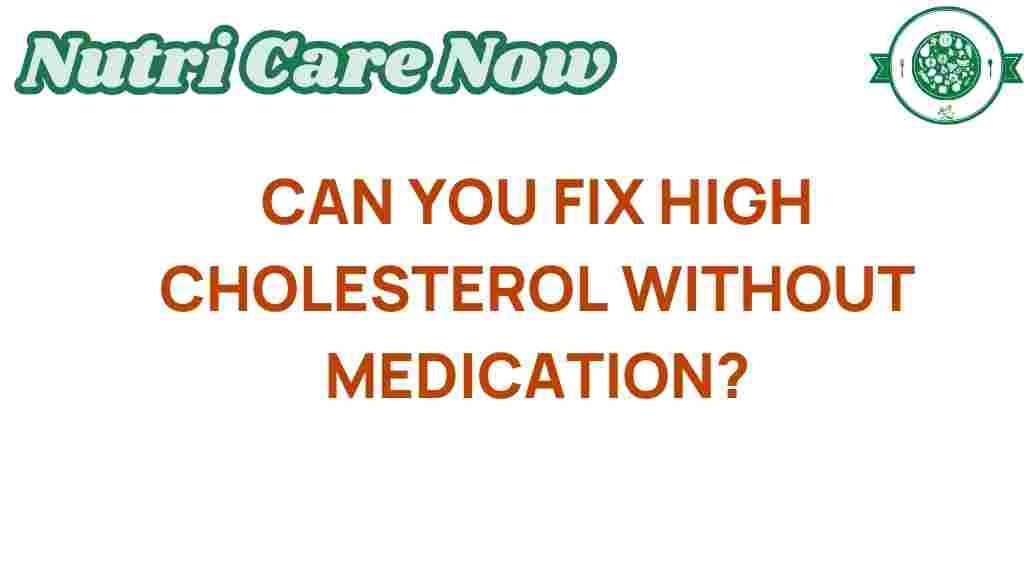Can You Tackle High Cholesterol Naturally Without Medication?
High cholesterol is a common concern for many individuals, often leading to serious heart health issues. While medications are available to help manage cholesterol levels, many people are interested in exploring natural remedies to tackle this issue. The good news is that with the right lifestyle changes, diet, and a focus on overall wellness, it is possible to manage cholesterol levels effectively without relying solely on medication. In this article, we will explore various strategies that can help you improve your heart health naturally.
Understanding Cholesterol
Cholesterol is a waxy substance found in your blood that is essential for building healthy cells. However, too much cholesterol can lead to heart disease. There are two types of cholesterol: low-density lipoprotein (LDL), often referred to as “bad” cholesterol, and high-density lipoprotein (HDL), known as “good” cholesterol. Maintaining a balance between these two types is crucial for heart health.
Step-by-Step Process to Tackle High Cholesterol Naturally
Managing cholesterol levels naturally involves a combination of dietary changes, physical activity, and sometimes supplements. Here’s a step-by-step guide to help you on your journey:
1. Revamp Your Diet
Your diet plays a pivotal role in cholesterol management. Here are some dietary changes that can help:
- Increase fiber intake: Foods high in soluble fiber, such as oats, beans, lentils, and fruits, can help lower LDL cholesterol.
- Choose heart-healthy fats: Replace saturated fats found in red meat and full-fat dairy with unsaturated fats found in olive oil, avocados, and nuts.
- Incorporate omega-3 fatty acids: Foods like salmon, mackerel, chia seeds, and flaxseeds can promote heart health.
- Avoid trans fats: These unhealthy fats are often found in processed foods and should be eliminated from your diet.
- Eat more fruits and vegetables: Aim for a variety of colorful produce, which can provide essential nutrients and antioxidants.
2. Maintain a Healthy Weight
Being overweight can contribute to high cholesterol levels. Losing even a small amount of weight can make a significant difference. Here are some tips to help you manage your weight:
- Set realistic goals: Aim for gradual weight loss rather than drastic changes.
- Monitor portion sizes: Be mindful of how much you eat, and try using smaller plates.
- Keep a food diary: Tracking what you eat can help you identify unhealthy patterns.
3. Stay Active
Regular physical activity is essential for heart health and can help lower LDL cholesterol while raising HDL cholesterol. Here are some fitness tips:
- Engage in aerobic exercise: Aim for at least 150 minutes of moderate aerobic activity each week, such as brisk walking, cycling, or swimming.
- Include strength training: Incorporate weight lifting or resistance exercises at least two days a week.
- Stay consistent: Find activities you enjoy to make it easier to stick to your fitness routine.
4. Consider Natural Supplements
Some supplements may help improve cholesterol levels. Consult with your healthcare provider before starting any new supplement regimen. Some popular options include:
- Plant sterols and stanols: These substances can help block cholesterol absorption in the intestines.
- Omega-3 fatty acids: Fish oil supplements may lower triglycerides and improve heart health.
- Psyllium husk: A soluble fiber that can help lower LDL cholesterol.
5. Manage Stress
Chronic stress can negatively impact heart health and cholesterol levels. Here are some stress management techniques:
- Practice mindfulness: Meditation and yoga can help reduce stress and promote relaxation.
- Engage in hobbies: Spend time doing things you love to help relieve stress.
- Establish a support network: Connecting with friends and family can provide emotional support.
6. Quit Smoking and Limit Alcohol Intake
Both smoking and excessive alcohol consumption can negatively impact your cholesterol levels and overall heart health. Here’s how to approach these issues:
- Seek support to quit smoking: Consider counseling or support groups to assist you in quitting.
- Limit alcohol consumption: If you drink, do so in moderation—up to one drink per day for women and two for men.
Troubleshooting Tips
Even with these changes, you may encounter challenges in managing your cholesterol levels. Here are some troubleshooting tips:
- Track your progress: Regularly check your cholesterol levels and keep a log of your dietary and lifestyle changes.
- Consult a dietitian: A registered dietitian can help tailor a specific plan to meet your needs.
- Stay informed: Read reputable sources to stay updated on cholesterol management and heart health.
Conclusion
High cholesterol does not have to be managed solely through medication. By implementing effective lifestyle changes, optimizing your diet, engaging in regular fitness activities, and considering natural remedies, you can take significant strides towards better heart health. Remember that managing cholesterol is a journey, and it’s important to consult with healthcare professionals to guide you along the way.
For more information on heart health and cholesterol management, visit the American Heart Association. You can also explore additional resources on natural remedies and wellness tips.
Embrace these changes not only for your cholesterol levels but for your overall wellness and quality of life!
This article is in the category Health and created by NutriCareNow Team
